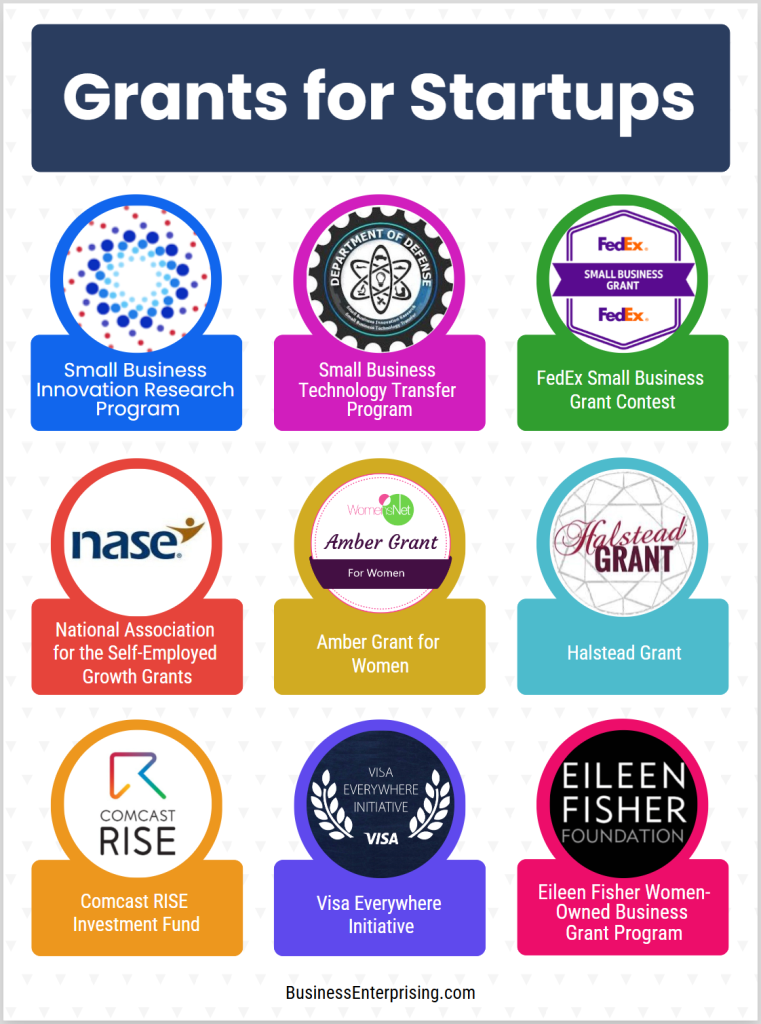 Starting a business comes with challenges, especially when it comes to securing funding. Small business startup grants can be a valuable resource. Unlike loans, grants provide financial support without repayment obligations, making them an attractive option for new entrepreneurs. However, understanding how to find and apply for these grants is essential to take advantage of them.
Starting a business comes with challenges, especially when it comes to securing funding. Small business startup grants can be a valuable resource. Unlike loans, grants provide financial support without repayment obligations, making them an attractive option for new entrepreneurs. However, understanding how to find and apply for these grants is essential to take advantage of them.
Additionally, these grants often target specific industries, demographics, or business goals. Therefore, finding the right grant for your business requires careful research and planning. By exploring available opportunities, you can identify grants that align with your goals and eligibility. Taking the time to prepare a strong application increases your chances of success.
Applying for grants can also strengthen your business in other ways. It encourages you to clarify your objectives and refine your business plan. Furthermore, the process can connect you with valuable networks and resources. Small business startup grants not only offer funding but also open doors to growth and development.
Understanding Small Business Startup Grants: What They Are and How They Work
Small business startup grants are a form of funding designed to help new businesses cover initial expenses without creating debt. Unlike loans, grants do not require repayment. This makes them an attractive option for entrepreneurs looking to grow without the added pressure of interest payments. These grants are typically offered by government agencies, nonprofit organizations, or private entities to support economic growth and innovation.
A key difference between grants and loans is the absence of financial liability. While loans require you to pay back the borrowed amount, often with interest, grants are essentially free money. However, they often come with specific requirements or conditions. For example, some grants may target businesses in certain industries, such as technology or renewable energy. Others may prioritize entrepreneurs from underrepresented groups.
Applying for small business startup grants requires time and effort, but the benefits can be significant. You can use grant funds for various purposes, including equipment, marketing, or operational costs. Additionally, receiving a grant can increase your business’s credibility and open doors to additional funding opportunities. That said, competition for grants can be fierce. You must submit a strong application and meet all eligibility requirements to stand out.
These grants work by providing you with capital while promoting broader goals, such as job creation or innovation. They allow you to focus on building your business without the burden of financial strain. By understanding how they work, you can make informed decisions about pursuing them as part of your funding strategy. Small business startup grants offer a practical way to access resources while keeping long-term finances intact.
Types of Small Business Grants Available for Startups
Small business startup grants come in various types, each tailored to meet specific needs and priorities. Federal grants are one of the most widely known options. These grants often target industries like technology, agriculture, and renewable energy. They aim to support businesses that can drive economic growth or meet national priorities. However, federal grants are competitive, so you must meet strict requirements to qualify.
State grants are another popular option. These grants often focus on supporting local economic development. They may prioritize startups in key industries for your region, such as manufacturing, tourism, or healthcare. Additionally, state grants can sometimes offer more flexible requirements than federal grants, making them a good choice for smaller businesses.
Local government grants are ideal if your business has a direct impact on your community. These grants might target businesses creating jobs, revitalizing neighborhoods, or addressing local challenges. For example, local grants may be available for small retail shops, community-focused services, or sustainable initiatives. Since competition for these grants is often smaller, they can be more accessible.
Private sector grants provide another valuable option. Many corporations and foundations offer grants to support entrepreneurship or innovation in specific industries. For example, technology companies often fund startups developing new software or products. Additionally, some private grants focus on supporting women, veterans, or minority-owned businesses.
By understanding the types of small business startup grants available, you can better identify those that align with your goals. Each type offers unique advantages, so exploring all options can help you secure the funding you need. Transitioning from one grant type to another can also expand your opportunities. Knowing where to look and which grants fit your business will simplify your search and increase your chances of success.
Top Grants for Small Businesses
Several notable small business startup grants are available to help you secure funding for your business. The Small Business Innovation Research (SBIR) program is one of the most well-known grants. It supports startups focused on technological innovation and research. To qualify, your business must meet federal standards and demonstrate potential for growth. This grant is competitive, but its funding can be substantial.
Another option is the Amber Grant, which specifically supports women-owned businesses. This grant awards monthly funding to help women pursue their entrepreneurial goals. To apply, you need to submit a short application outlining your business idea and future plans. Additionally, there is a chance to win extra funding at the end of the year.
For businesses in rural areas, the USDA Rural Business Development Grant can be a great fit. It aims to support economic development in rural communities. Eligibility often depends on your location and the potential impact of your business on the local economy. This grant focuses on small businesses and startups with fewer than 50 employees.
Corporate grants, such as those offered by FedEx, provide additional opportunities. The FedEx Small Business Grant Contest awards funding to innovative and impactful businesses. Applicants need to submit a detailed business plan and compete against other startups for the prize. However, the publicity from participating alone can benefit your business.
These small business startup grants offer valuable resources to grow your business. Each grant has specific eligibility requirements, so carefully review the details before applying. Exploring these options can provide the funding you need to start and expand your business successfully. Taking the time to prepare strong applications will improve your chances of securing support.
How to Determine Your Eligibility for Startup Grants
Determining your eligibility for startup grants is an important step in accessing funding. Small business startup grants often have specific criteria that businesses must meet. To start, review the grant’s purpose and ensure it aligns with your business goals. Many grants target specific industries, such as technology, green energy, or healthcare. If your business operates in one of these areas, you may qualify.
Additionally, some grants are designed for specific demographics. Grants for women-owned, minority-owned, or veteran-owned businesses are widely available. If you meet these criteria, you can explore opportunities tailored to your background. However, you may need to provide documentation to verify your eligibility. This can include proof of ownership or certifications for certain groups.
Your business size and location can also play a role in grant eligibility. Many grants are intended for small businesses with a limited number of employees or specific revenue thresholds. Additionally, grants from local or state governments often prioritize businesses that benefit their communities. If your startup creates jobs or supports local development, it could improve your chances.
It’s also important to evaluate your business stage. Some grants are available only to startups in their earliest phases, while others may focus on businesses ready to scale. By understanding where your business fits, you can identify grants that match your needs. Taking time to assess these factors will help you narrow your options.
Small business startup grants provide an opportunity to fund your goals without debt. Reviewing grant requirements and aligning them with your qualifications is essential. With careful research and preparation, you can identify the best grants for your business and improve your chances of securing funding.
Step-by-Step Guide to Applying for Small Business Grants
Applying for small business startup grants requires careful planning and attention to detail. Start by researching grants that match your business goals and eligibility. Look for grants specific to your industry, location, or business type. Additionally, review the application guidelines thoroughly to understand what is required. Missing even one detail can disqualify your application.
Next, focus on gathering all necessary documents. Most grants require a business plan, financial statements, and proof of eligibility. Additionally, you may need to provide tax records or certifications if the grant targets specific demographics. Having these documents ready in advance can save time and prevent delays. Therefore, organize your paperwork before starting the application process.
When writing your proposal, clearly outline how the grant funds will benefit your business. Use concise and professional language to explain your goals. Additionally, emphasize how your business aligns with the grant’s purpose. For example, highlight any community impact, innovation, or job creation your business offers. Strong proposals often stand out by directly addressing the grant provider’s priorities.
Deadlines are critical when applying for grants. Missing an application deadline can mean losing out on funding opportunities. Therefore, create a schedule to track deadlines for each grant you pursue. Submitting your application early also gives you time to make corrections if needed. Pay close attention to any confirmation requirements after submission.
Applying for small business startup grants can be a competitive process, but preparation makes a difference. By following these steps and staying organized, you increase your chances of success. Take the time to craft a strong application that demonstrates your business’s potential and aligns with the grant’s goals.
Tips for Maximizing Your Chances of Securing a Grant
To maximize your chances of securing a grant, you need a strong strategy. First, tailor your application to the grant’s goals. Many small business startup grants prioritize specific industries, demographics, or business impacts. Therefore, align your proposal with those priorities to make a compelling case. Use clear and concise language to demonstrate how your business stands out.
Additionally, networking can play a significant role in your success. Attend industry events, workshops, or community gatherings where grant opportunities are discussed. Connecting with others who have successfully secured grants can provide valuable insights. These relationships can also lead to recommendations or introductions that strengthen your application. However, focus on building genuine connections rather than simply seeking favors.
After submitting your application, following up can make a difference. Send a polite email to confirm receipt and express your interest. Additionally, if grant administrators allow questions, use this opportunity to clarify details or discuss your application further. Maintaining communication shows your commitment and professionalism.
Another tip for standing out is preparing thoroughly before you apply. Invest time in writing a proposal that highlights your business’s strengths and long-term potential. Strong proposals include measurable goals and specific ways the grant funds will support those goals. Additionally, seek feedback from mentors or peers to improve your application.
Maximizing your chances of securing small business startup grants requires effort and strategy. By tailoring your proposal, networking effectively, and following up, you can increase your likelihood of success. Paying attention to details and presenting a well-prepared application demonstrates your dedication and sets your business apart.
Conclusion
Securing small business startup grants can be a meaningful step toward growing your business. These grants provide funding without adding debt, allowing you to focus on achieving your goals. However, the process requires careful planning and preparation. By understanding grant requirements and aligning them with your business objectives, you can improve your chances of success.
Additionally, applying for grants offers more than just financial benefits. It encourages you to refine your business plan and articulate your vision clearly. Networking opportunities can also arise throughout the application process, connecting you with valuable resources and potential partners. Therefore, the effort you put into seeking grants often brings additional rewards beyond funding.
While competition for grants can be challenging, your preparation and dedication can set you apart. Each step you take, from researching opportunities to submitting a strong application, brings you closer to achieving your goals. Small business startup grants can provide the support you need to launch or grow your business with confidence. By staying focused and proactive, you can take full advantage of the opportunities they offer.



